

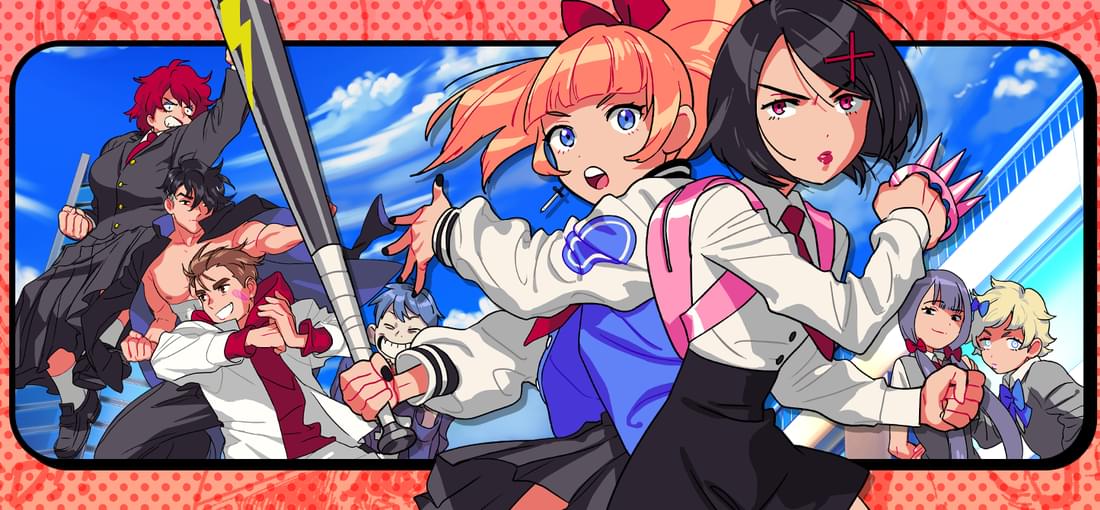
"River City Girls" has a long and complicated lineage, one older players may remember from "River City Ransom" on the NES, or "Renegade","Super Dodge Ball" or other arcade games. There are a ton of in-jokes for players of many of the decades of games Tecnos had a hand in, including characters from the Double Dragon games putting in appearances. If you spent a lot of your youth in arcades or in front of a console, you may get more out of the experience. The underlying game is a side-scrolling brawler in a similar vein to "Final Fight" or "Streets of Rage". In terms of the audio-visual, the game is a treat. The pixel art is lovingly crafted and animated; colorful, expressive, and fluid, with exaggerated character bursting from every frame. The music has a very eighties-synth vibe with a breathy female lead vocal; the voice work has a gleeful cartoon exuberance, and the sound FX offer a knowing wink at 8- and 16-bit styles. The gameplay is, sadly, only okay. There's an ability to recruit followers by sparing a begging final enemies, but most of my attempts to use them ended with them getting knocked out before they actually performed their move. There's a block button and "special" attacks with their own meter, but I got through most of the game without using them, and trying to block part of a combo is so hit-or-miss that it's basically a last resort. Weapons are nice, but they radically narrow your moves, denying you access to things like ground stomp. You can pick up downed foes and hit other foes with them, which never stops being funny, but becomes all but necessary in high-population fights. Purchasing and consume food from inventory mid-fight makes the first boss (before you encounter stores) the hardest in the game. Grabbing a foe or weapon by accident and leaving yourself vulnerable is a real problem. A lore-heavy in-joke makes the ending a big anticlimax. It's never hard enough to really frustrate, but it doesn't flow like, say, SOR4. Call it 3 1/2 *.
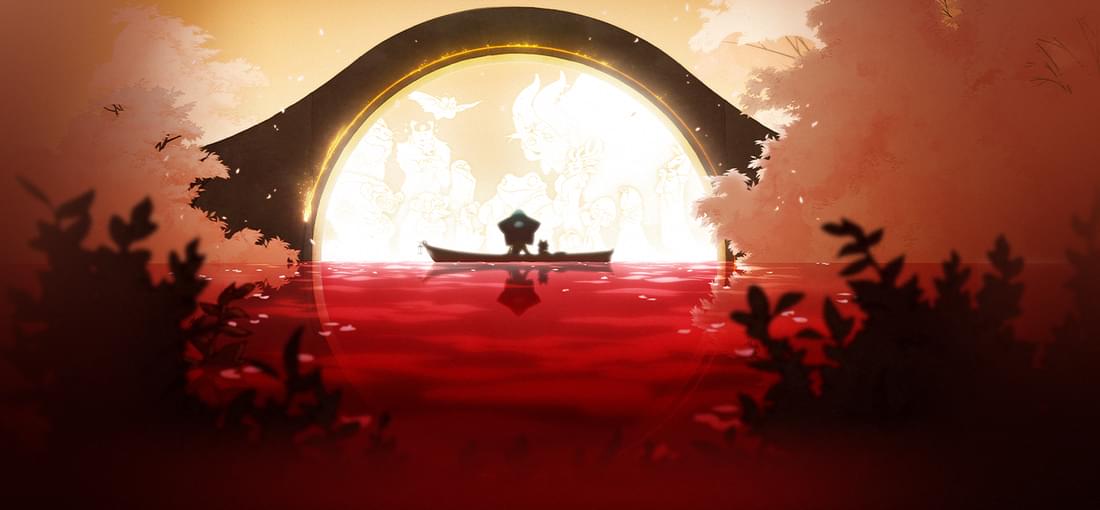
"Spiritfarer" is very beautiful. The amount of care taken in animation, especially of the main character, would put many games with far more money and manpower put into them to shame. The relatively simple, high-contrast color palette makes everything pop like something from a golden age cartoon, while individual scenes and images bring up wonder, awe, and mystery while making it look effortless. The gameplay is... good. I'm tempted to use words like "acceptable" or "competent", but that's damning with faint praise, and it deserves better than that. There are moments where I feel nothing would have been lost by making a space between jumps a little shorter or requiring a tad less grinding, and a few intuitive leaps I wouldn't have minded a clue about, but... It's hard to explain. The game very much isn't *about* the things you do in jumping, running, harvesting crops and mining ore, so it feels petty to harp on small impatiences with those mechanics. They do fill up a fair amount of your play-time, and they do begin to feel a little like filler by the end. But most of the play-time (mine, anyway), they're just more time to enjoy those lovely animations and settings. This is a game about grief and loss. If you don't remember that, boy howdy, will it hit you before the game is over. Grief and loss being very personal things, I cannot unconditionally recommend the game to everyone, and it's the one big thing keeping me from giving the game that five stars, much as I think the vast majority of people would get something out of it just for artistic beauty. Smaller gripes include one character who is basically seems to be there to import the message "life isn't fair". And for once, I wish the protagonist wasn't mute, to pipe back: "Lady? I don't need you to 'teach' me life isn't fair; I have a LIFE to do that." The lack of individuality in townsfolk, and certain other details, also suggests budget constraints. But I'd care less if what's forefront wasn't so well done.
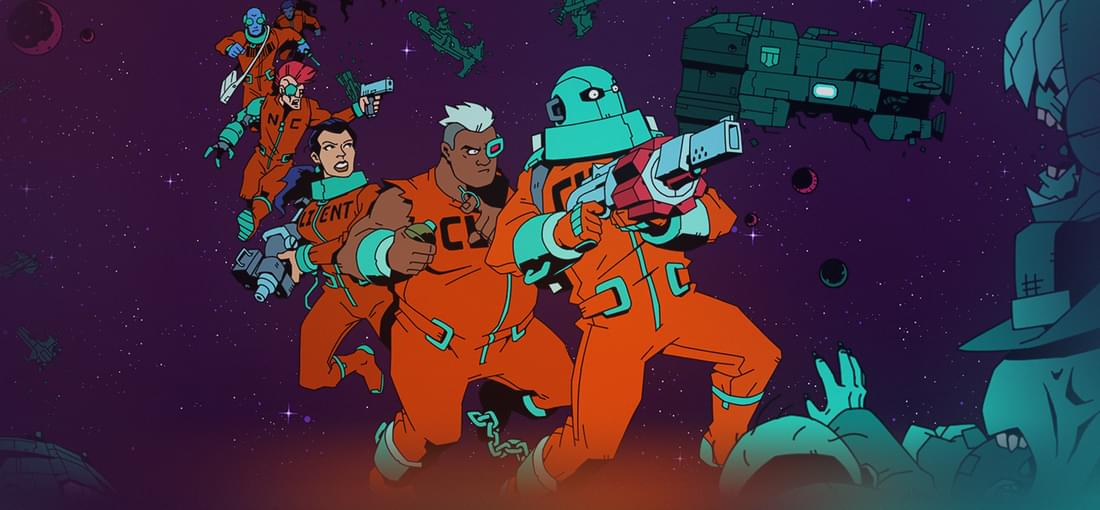
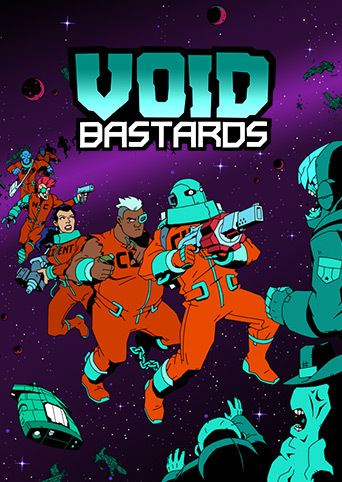
Void Bastards is a first-person shooter with some mild rogue-like elements. You play as one of a succession of freeze-dried convicts with various genetic traits to mix things up- color-blindness, the ability to pick things up at a distance, shortness, and an inability to suppress the urge to scream "Woo-hoo!" every time you pick up a piece of loot, to name a few. The mood and aesthetics of Void Bastards are definitely its high point. With a subdued palate and cell-shaded graphic style, VB owes more than a little to the comics of 2000 AD and Judge Dredd. The plot similarly sees the player wound up in an inescapable nightmare tangle of bureaucratic nonsense with computer systems prescribing courses of action that contradict their own rules and priorities. (The audio systems of the ships where most of the action takes place warn that filling out forms may result in paper cuts, which will in turn require their own forms...) There is a very dark, dry, British sense of humor in play that I personally find quite enjoyable; just don't expect a happy ending. The FPS/collection/craft loop is enjoyable, but it definitely feels "indie" in the sense that perhaps it could have used one more round of polish. Things like railings that the player can't quite jump over, finding multiple enemies camped outside the starting area of a ship, and the "spread" of inaccuracy the player experiences with most of the weapons (while the enemies remain annoyingly accurate at a distance without need to reload) seem like things that a little more playtester feedback could have ironed out. It's all perfectly competent and playable, mind, but it's annoying to lose a character because your trap-grenades mysteriously sink through the floor, for some reason, or because your stapler (shotgun-equivalent) decided to shoot everywhere but at the security camera you were aiming at from point-blank range. Still, if you can get VB on sale, it's well worth your 10-15 hours.
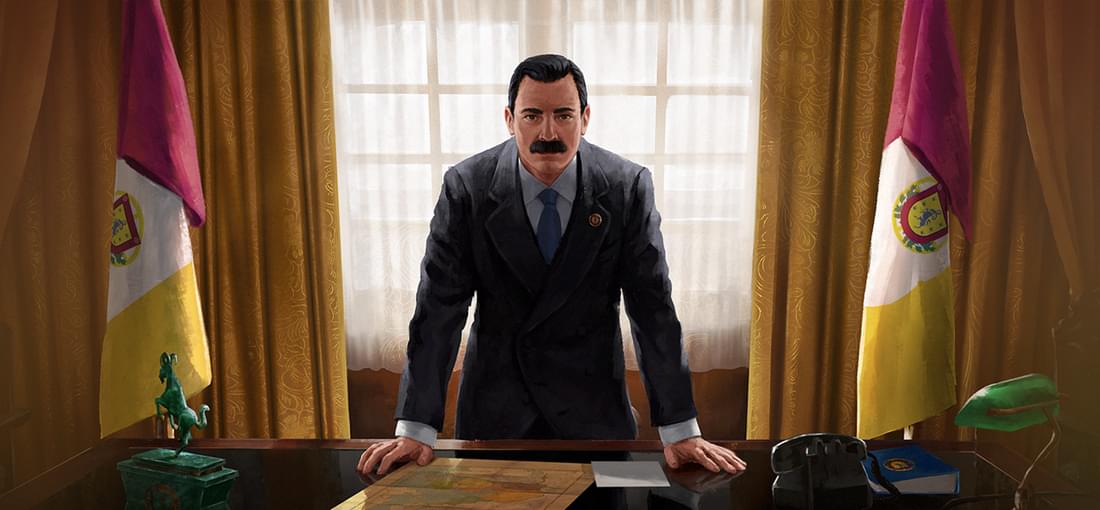
"Suzerain" casts the player as the newly-elected President of a country emerging from years of turmoil after the reigns of two very different Presidents. The game is fictionalized, freeing the creators to make their own history and figureheads, but there are very clear parallels with the real-world situation in the mid-fifties, with yours as a medium-sized European country often dealing with regional rivalries and the machinations of world superpowers. Most of the choices the player makes in the game are simple multiple choice responses to dialogues, with a few binary choices (like whether to sign or veto a bill) and a few sliders (how much to privatize or maintain state control over particular companies). Despite the lack of fine, micro-control, the writing, strongly portrayed characters, and tense decisions all help to give the player a sense of weight (and sometimes the accompanying dread), even with such simple questions as how to greet a world leader or address your son's smoking. It warrants praise that the game appears to offer some way through via a variety of political tactics, whether one wants to be a liberal reformer or a hard-line near-dictator. What the game does not, in my limited play-through, seem to appreciate is half-measures. You may not be tripped up by every mistake, but fail to keep your promises, to individuals or to the country, and people will remember. If I were to cite one significant flaw, it's the way budget is handled. Predictably, large deficits are not a good thing, and there's never enough budget for all you might want to do. But the game does a poor job of giving you a sense when new expenditures will emerge, and even less when financial policies might see results or windfalls come through; two unannounced late-emerging bills that occurred in a single turn seemed to have more of an effect on the hard numbers than long-term infrastructure choices. Fascinating and a little draining (like a real presidency), Suzerain has my vote.
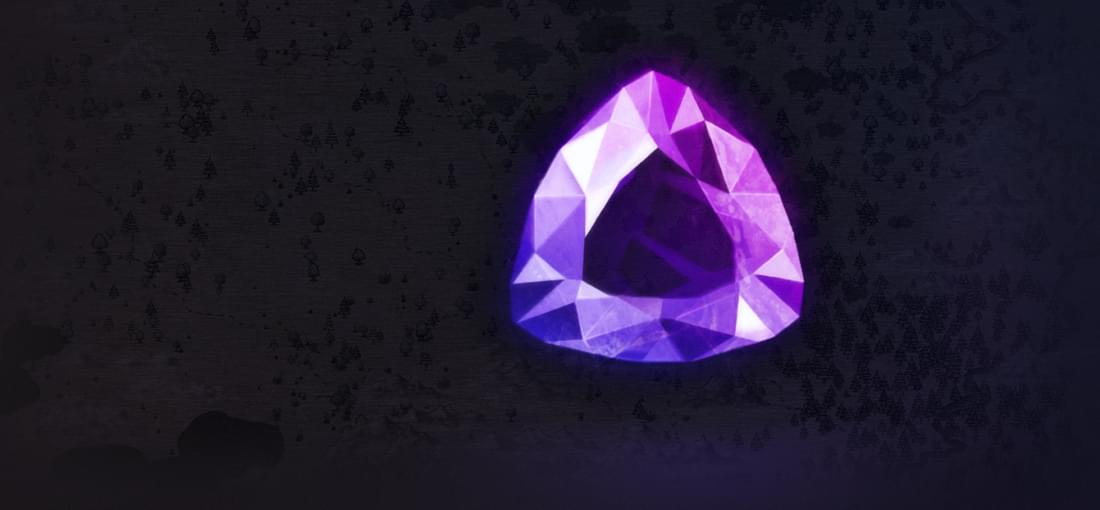
GemCraft is a tower defense game. As other reviews have mentioned, the game offers a lot of flexibility in how you set up defenses. There are gems you can slot into defenses with a variety of effects (increased mana, critical hits, armor-breaking...) different kinds of buildings that will change how those gems interact, a huge skill tree. You can build walls to try to send the swarms on an optimal path, even pause and re-route the enemy flow, given mana and time. All of this was in previous GemCraft games. There are some additions, like lanterns, and probably more I have yet to see. I don't know if I ever will, however. Because the vast majority of the changes that have been made arbitrarily and gratuitously make the game harder, with no real benefit to the player unless they're the sort who really enjoys repeating the same sequence over and over again to minimal benefit. To be clear, this goes way beyond "grinding". The amount of mana (building currency) you have is contingent on the amount of skill points you don't apply to actual skills, so having enough to build gems that can even take out the early enemies often means leaving a majority of your hard-earned points un-used. The "endurance" mode re-plays are touted as a way to grind, but the game actually punishes you for winning such a level by adding more waves to future ones. Not just the level you beat- ALL endurance levels. So you spend a lot of time losing everything in the last few waves, wondering if a few more grinds in earlier levels would make a difference. Even the interface is a downgrade. Making higher level gems is now a fiddly hassle. Accidentally making a lower-level gem than you needed means you may as well start over. Necessary info is scarce. The unlocking of new skills is slow and tedious. Even the creator acknowledges testers found the game too hard, and responded about as resentfully as possible with an "easy" level that limits your options and can't be undone once used. It's a shame.
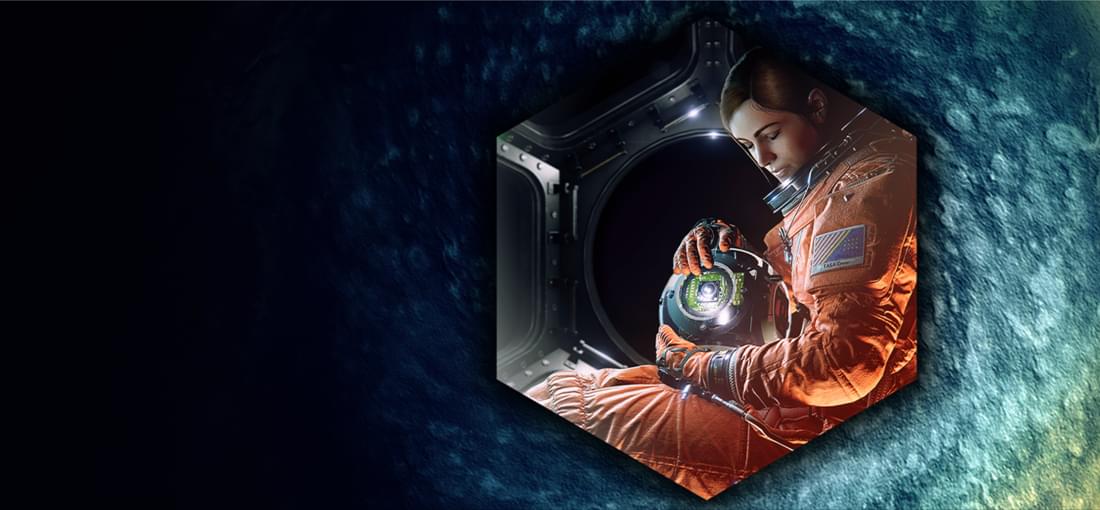
It has been suggested that playing "Observation" is not unlike taking the role of "HAL", the rogue AI from the renowned novel/movie "2001". That is not an inaccurate comparison, although "SAM", the AI you embody, is... arguably?... More benign? Much like No Code's prior entry, "Stories Untold", a tremendous amount of "Observation"'s strength comes down to atmosphere. The game does an excellent job of making you feel the claustrophobia and disorientation of its space station environment, and mostly, that's a good thing. It feels like it could be a real place, inhabited by a real international crew. For fans of "Stories", I would make a case that "Observation" also has the stronger story of the two (I had some issues with "Stories" denouement), but perhaps balanced by the greater variety of environment and play in "Stories". You do the same tasks frequently in "Observation", and while it mostly hits the sweet spot of "I'm getting good at this" rather than "I'm getting bored with this", I suspect results may vary. Without intending to damn with faint praise, I will say that it's as well "Observation" isn't a lengthier game than it is. You can do a lot of wandering trying to find the next story point (I hit a FAQ at a couple of points, mostly related to things not being where expected on the outside of the station), and some spots feel not unlike trying to find the "hot spot" in an old-school adventure game, only in a three-dimensional zero-gravity environment, sometimes while using the interface of cameras with extremely slow panning to find those hot spots. This is sounding more negative than I probably intend. The bottom line is that I came away from "Observation" satisfied with the time I spent on it. It tells a fascinating story, leaving a few things to the player's interpretation without being needlessly opaque. It's surprising how attached you become to SAM and Fisher. It's creepy without being overly jump-scary or violent. I thoroughly approve.
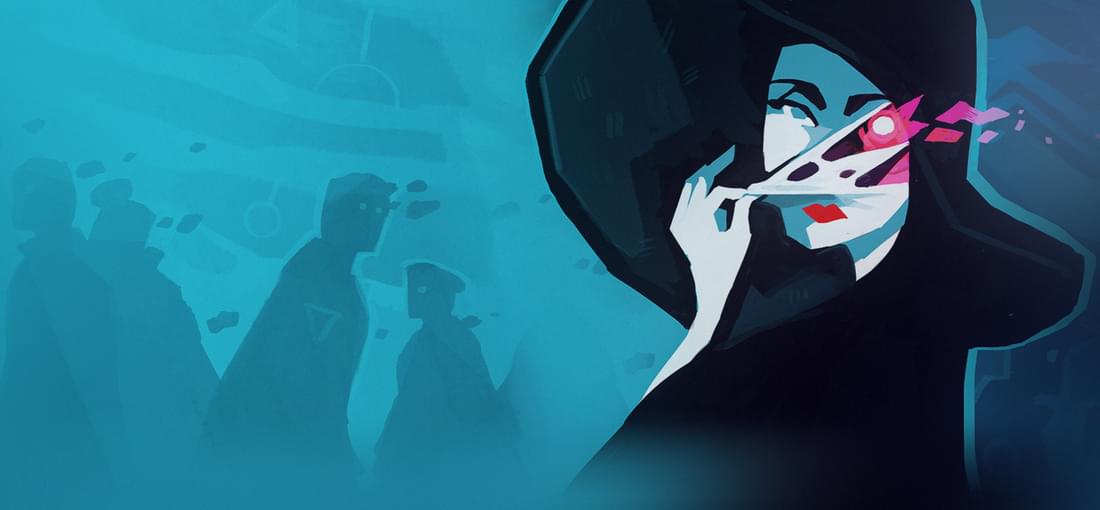
First off, I played the mobile, rather than the PC version of this game. Reading other reviews leads me to believe the issues I've had are identical. I should say at the outset that the game does an admirable job in piecing the drawing of cards together into something resembling an actual story, which is no small feat. And perhaps, given the tone and subject matter, it should come as no particular surprise that many play-throughs will end in stories with unhappy endings. The writing underlying the game is pretty solidly done. The game itself is, far too often, a needless exercise in frustration. And it's harder to forgive that because one gets the sense that that frustration is, at least in part, a deliberate attempt to prevent players from moving through its limited array of content too quickly. Problems come up, sometimes problems that threaten to end the game in the near- or far-future, and the game is unnecessarily opaque about what one might do or have done to prevent them, cancel them, delay them. Many problems that seem like they ought to have obvious ways to remedy or at least ameliorate them with the resources the player has at hand instead require specific cards obtained in specific circumstances, circumstances which remain unclear to the player as they helplessly watch the procession of timers on "bad event" cards tick away. Other times, a player might well know what they want to accomplish, only to miss an opportunity simply because they're trying to keep track of too many things at the same time- an unusual struggle in a card game, to say the least. (The way screen "real estate" is handled, as others have mentioned, only worsens this problem.) Left with little more than guesswork and trial-and-error to address many challenges, repetition sets in, and quickly begins to frustrate. After playing the game through to a "lesser victory" state, I quickly lost interest in grappling with it. At a significant discount, I can recommend it as a curiosity.
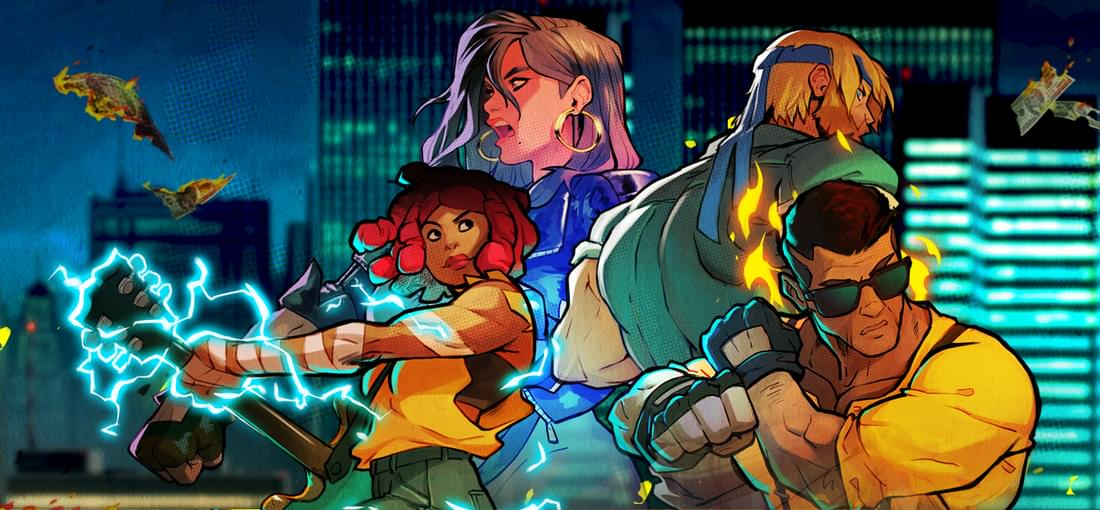
I was not a Genesis kid. One of my friends had a Genesis, but few games; another had a SNES, and his house was where my group of friends often wiled away the evenings. But I spent plenty of hours on beat-em-ups at arcades, mastering games like Kung Fu Master, Double Dragon, and that from which SoR clearly took its greatest influence, Final Fight. I've since gone back and played some of the original SoR games in collections. And, they're fine... but time has not been entirely kind. But I think SoR4 is brilliant. The controls feel solid, responsive, and fluid. It makes effective use of the four face buttons on a modern controller without bogging down with the superfluous over-complications some games run into, feeling obligated to use every piece of controller real estate. Anyone who likes action games at all could pick up a controller and play, and feel like they were effective, while still rewarding thoughtful, strategic, and practiced play with feelings of skill-building and achievement. If you're like me, you'll watch your end-of-level grade creep up with pleasure. I've now played through with four of the "base" characters (more are unlocked through repeated play, mostly "classic" versions of SoR characters), and all feel distinct. Some have a more effective air game, some are most devastating on throws, some just hit really hard. You most powerfully feel this in dealing with bosses, discovering how one you breezed through with Axel is a pain with Cherry, or vice-versa. There are occasional "cheap" moments- a bad guy flashes when you're locked in mid-combo on one of his colleagues, and moves in for an unavoidable combo or throw- but mostly, there are learnable strategies to deal with all of the mooks. Regrettably, I can't yet comment on multiplayer. I look forward to a couch-coop, which I suspect will be the best way to experience it. I get people's frustration about the absence of online play, but honestly- I've had a blast, even playing this single-player.